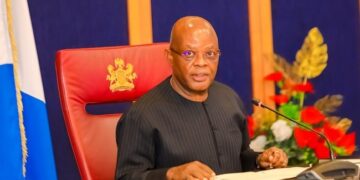By Elton Onwu
Amidst the whirlwind of my schedule these past weeks, I found myself at dawn grappling with how to properly capture the essence of this extraordinary leader. The challenge wasn’t from lack of material – quite the opposite. His impactful leadership has left such uncountable marks in the head that selecting what to say became an exercise in delightful difficulty. The sheer breadth of his accomplishments is truly without precedent.
Then clarity emerged from this contemplative struggle. For years, conventional wisdom held that the South East might never again produce a unifying statesman capable of channeling the visionary leadership of our founding fathers in modern Nigeria’s complex political landscape. Yet today, we have seen Benjamin Kalu with the unyielding determination of a bull and the strategic brilliance of a chess grandmaster, quietly rewriting the rules of political engagement in Abuja. He moves with the assured grace of a leader who understands both his purpose and his power.
At 54, Kalu embodies the paradox of modern Nigerian leadership: a politician who shuns theatrics but commands attention, an Igbo son who has become a national bridge, a deputy speaker whose influence quietly outstrips his title. His is not the flamboyant rise of overnight political celebrities, but the steady ascent of a leader playing the long game and winning at the same time.
Like the Taurus that governs his birth month, Kalu charges at obstacles with calculated force. When others zig, he zags. While peers grandstand about marginalisation, he is in backrooms negotiating tangible wins for the South East, not with emotive rhetoric, but with blueprints. His “Peace in South East” initiative isn’t performative; it’s a surgical strike against the region’s economic suffocation, addressing both symptoms (insecurity) and disease (systemic neglect).
Then come the long-awaited South East Development Commission (SEDC) is finally a reality, a landmark victory for the people of South East Nigeria. For over a decade, this crucial bill languished in the National Assembly, trapped in legislative gridlock while the region’s infrastructure deficits, economic disparities, and security challenges grew more pressing. But thanks to the relentless efforts of leaders like Benjamin Kalu, who reignited the fight and championed its passage, the SEDC has now been established to deliver transformative change.
This commission is not just another bureaucratic body, it is a vital instrument for redressing historical neglect, accelerating infrastructure development, and unlocking the South East’s immense economic potential. With strategic investments in roads, power, education, and security, the SEDC will foster sustainable growth, create jobs, and restore the region’s competitive edge.
Watch how he operates: no fiery interviews, no social media tirades. Just results with billions funneled into critical infrastructure, discreet job placements for constituents, and a legislative record that prioritises empowerment over empty symbolism.
Kalu’s genius lies in his refusal to be pigeonholed. To the North, he is not “just another Igbo politician”; he is the man who secured cross-party backing for every Nigeria’s project, from the South to the North. To the South East, he is more than a representative, he is the architect of a new narrative, proving that influence is not about shouting the loudest but delivering the most.
There’s a lesson in Kalu’s rise for anyone who cares about Nigeria’s future. In a country where political discourse has become increasingly performative, he reminds us that substance still matters. That you can command respect without bullying, build alliances without compromising principles, and serve your people without turning governance into theater. His secret? An almost old-fashioned belief that leadership is about problem-solving, not posturing.
The South East has noticed. There’s a new generation of professionals returning home, not because the roads are perfect yet, but because they can see the direction of travel. Investors are taking second looks, not just because of its famed entrepreneurial spirit, but because someone in Abuja is finally creating the policy environment to match it. This is the Kalu effect – not dramatic transformations overnight, but the patient rebuilding of confidence in what governance can be.
And here is what his critics miss: Kalu isn’t just working for the South East. His legislative footprint spans healthcare reforms benefiting other regions. In another era, we might have called this statesmanship. Today, it’s something even more precious – proof that Nigeria can still produce leaders who see beyond ethnic arithmetic to national possibility.
As the 54-gun salute echoes today, it is worth pausing to consider what we are really celebrating. Not just a birthday, but a particular kind of Nigerian resilience – the sort that refuses to accept that things must always fall apart. Kalu’s story tells us that another politics is possible: one where preparation meets opportunity, where quiet competence eventually outshouts empty noise, where a leader’s worth is measured not in soundbites but in lives touched.
Happy 54th, Mr. Deputy Speaker. May your next year bring even more proof that in Nigerian politics, the bull can still win – not by charging recklessly, but by knowing exactly when and where to apply its strength.
Elton Onwu wrote from Abuja.









































Discussion about this post